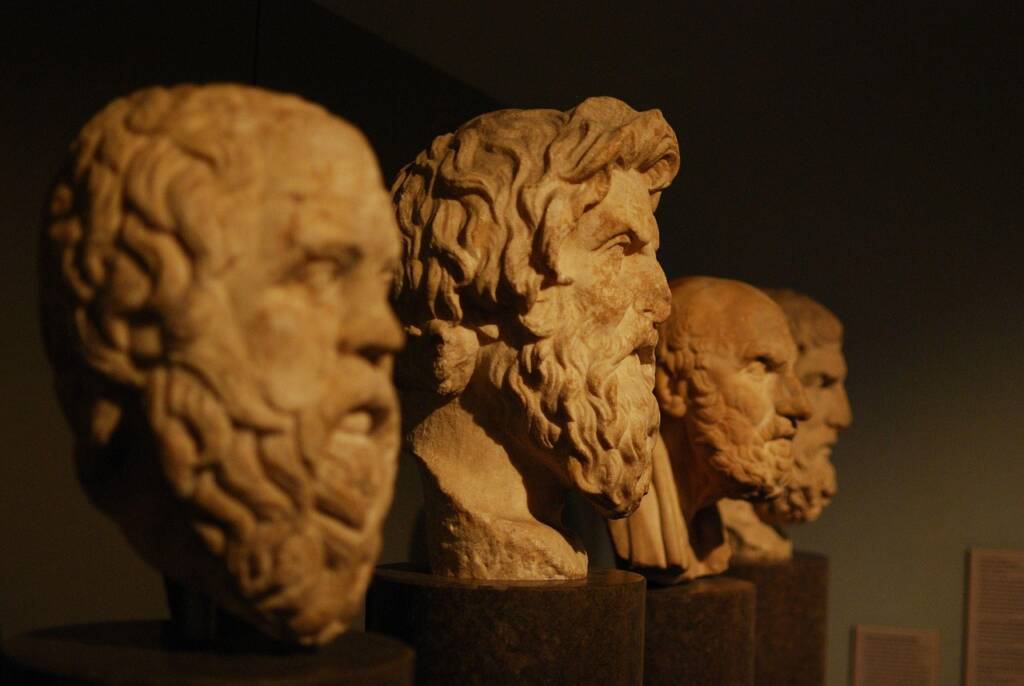
Adult Education Philosophy: The Big Picture

This course will take you on an exciting adventure that covers more than 2500 years. Along the way, you’ll run into some very strange characters. For example, you’ll read about a man who hung out on street corners, barefoot and dirty, pestering everyone he met with questions. You’ll read about another man who climbed inside a stove to think about whether he existed. Despite their odd behavior, these and other philosophers of the Western world are among the most brilliant and influential thinkers of all time. As you read about them, you’ll see where many of the most fundamental ideas of Western civilization came from. You’ll also get a chance to ask yourself some of the same questions these great thinkers pondered. At the end, you’ll have a better understanding of yourself and the world around you, from atoms to outer space and everything in between.
Major Topics and Concepts
Unit 1: The World of Wonder
- Define philosophy.
- Describe what philosophers study.
- Identify questions that philosophers ask.
- Explain what it means to do philosophy.
- State what philosophy can do for you.
Unit 2: From Mythology to Philosophy
- Explain why myth has been called the “cradle of philosophy.”
- Describe how Western philosophy first began in ancient Greece.
- List some of the questions that the earliest philosophers pondered.
- Identify pre-Socratic philosophers and state how they answered the questions.
- Explain how the earliest philosophers laid the foundations for science.
Unit 3: Socrates, Plato, and Aristotle
- Give an overview of the classical period of ancient Greece.
- Describe Socrates’ life and the Socratic method.
- Outline the events of Plato’s life and his main ideas.
- Summarize Aristotle’s life and his major contributions.
Unit 4: Hellenistic Philosophy: How Can Humans Be Happy?
- State the general aims of Hellenistic philosophy.
- Describe the philosophy of cynicism.
- List the ideas of the Epicureans.
- Describe stoic philosophy.
- Identify the basic views of the skeptics.
Unit 5: Christianity and Philosophy in the Middle Ages
- Describe the rise of Christianity in Medieval Europe.
- List the main influences on philosophy during the Middle Ages.
- Explain how Saint Augustine defended the Catholic Church.
- Describe the scholastic philosophy of Saint Anselm.
- Identify the contributions of Saint Thomas Aquinas.
Unit 6: The Rise of Modern Western Philosophy
- Outline major changes that occurred in Europe from 1400 to 1800.
- Identify influences on Renaissance philosophers such as Erasmus.
- Describe the rationalist philosophies of Descartes and Spinoza.
- Describe the empiricist philosophies of Locke and Hume.
- Explain how Kant combined rationalism and empiricism.
Unit 7: Western Philosophy in the Nineteenth Century
- Describe approaches to philosophy that began in 19th century Europe.
- List the main contributions of the German philosopher Georg Hegel.
- Summarize the philosophies of Schopenhauer, Kierkegaard, and Nietzsche.
- Identify the main ideas of Karl Marx and Jeremy Bentham.
Unit 8: Western Philosophy in the 20th Century
- Describe the philosophy of pragmatism.
- Give an overview of analytic philosophy.
- List the basic tenets of phenomenology.
- Identify the main ideas of existentialism.
- State how philosophy has changed your thinking.
Competencies
Christianity’s Impact on Philosophy in the Middle Ages
Students will demonstrate an understanding of Christianity’s impact on philosophy in the Middle Ages by explaining the rise of Christianity in Medieval Europe, summarizing influences on philosophy during the Middle Ages, and describing the scholastic philosophy of Saint Anselm.
Hellenistic Philosophies
Students will demonstrate an understanding of Hellenistic philosophies by summarizing the aims of Hellenistic philosophy, describing the philosophy of cynicism, explaining stoic philosophy, and summarizing the basic views of the skeptics.
Philosophers in the Classical Era
Students will demonstrate an understanding of philosophers in the Classical era by explaining the philosophical contributions of Socrates, explaining the philosophical contributions of Plato, and explaining the philosophical contributions of Aristotle.
Philosophical Movements in History
Students will demonstrate an understanding of philosophical movements in history by explaining early Greek influences on Western philosophy, summarizing the ideas of pre-Socratic philosophers, and explaining the contributions of the earliest philosophers to the foundations of science.
Philosophy during the Renaissance Era
Students will demonstrate an understanding of philosophy during the Renaissance era by summarizing the influence of key Renaissance thinkers, describing the rationalist philosophies of the era, and explaining the development of empiricist thought during this time.
Philosophy Fundamentals
Students will demonstrate an understanding of philosophy fundamentals By explaining the field of philosophy, summarizing the methods of philosophical inquiry, and analyzing the benefits of philosophy.
Philosophy in the 19th Century
Students will demonstrate an understanding of philosophy in the 19th century by explaining the influence of Georg Hegel on philosophical thought, describing central ideas developed by 19th-century philosophers, and summarizing the main ideas of Jeremy Bentham.
Western Philosophy in the 20th Century
Students will demonstrate an understanding of Western philosophy in the 20th century by describing the philosophy of pragmatism, summarizing analytic philosophy, and explaining the main ideas of existentialism.

